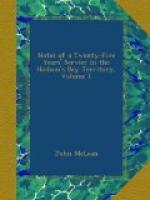STATEMENTS IN THE EDINBURGH
CABINET LIBRARY—ALLEGED
KINDNESS OF THE HUDSON’S
BAY COMPANY TO THE INDIANS—AND
GENEROSITY—SUPPORT
OF MISSIONARIES—SUPPORT
WITHDRAWN—PREFERENCE
OF ROMAN CATHOLICS—THE NORTH-WEST
COMPANY—CONDUCT
OF A BRITISH PEER—RIVALRY OF THE
COMPANIES—COALITION—CHARGES
AGAINST THE NORTH-WEST COMPANY
REFUTED.
A volume of the Edinburgh Cabinet Library, in which the Company’s territories are described, came lately into my hands. It is there remarked, that “the Company’s posts serve as hospitals, to which the Indians resort during sickness, and are supplied with food and medicine; that when winter arrives, the diseased and infirm are frequently left there; that the Company have made the most laudable efforts to instruct and civilize them, employing, at a great expense, Missionaries and Teachers,” &c.
I am well aware that the author of this valuable production took it for granted that the information he had obtained, relative to our treatment of the Indians, and other matters, was correct, or he would not have permitted it to go forth to the world under the authority and sanction of his name. But without intending any disrespect to the author, I take leave to state that the above quotations have not the slightest foundation in fact. Our posts serve as hospitals! I have now passed twenty-four years of my life-time in the country; I have served in every quarter of it; and I own that I have never yet known a single instance of an Indian being retained at any inland post for medical treatment. The knowledge the natives possess of the medicinal virtues of roots and herbs, is generally equal to the cure of all their ailments; and we are, in fact, more frequently indebted to them, than they to us, for medical advice. I may mention, however, by way of exception to the general rule, that the depots along the coast are well supplied with medicines, and that there are medical men there who administer them to the natives when they apply for them.
In the interior we are allowed to doctor ourselves as we best can. What with the salubrity of the climate, and our abstemious fare, we are enabled, with the aid of a little Turlington balsam, and a dose of salts, perhaps, to overcome all our ailments. Most of us also use the lancet, and can even “spread a plaster, or give a glister,” when necessary; but the Indians seldom trouble us.
As to the instruction the natives receive from us, I am at a loss to know what it is, where imparted, and by whom given. “A tale I could, unfold!” But let it pass: certain it is, that neither our example nor our precept has had the effect of improving the morals or principles of the natives;—they are neither more enlightened, nor more civilized, by our endeavours, than if we had never appeared among them. The native interpreters even grow old in our service as ignorant of Christianity as the rudest savages who have never seen the face of a white man.




